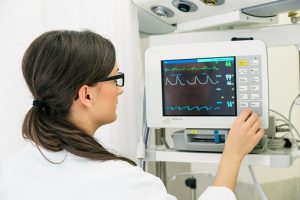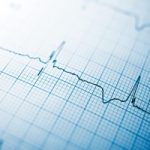 Women with early menopause have a lower risk of atrial fibrilliation (irregular heartbeat) as found by recent research. The study found that women who go through menopause earlier have a slightly lower risk of atrial fibrillation compared to women who experience menopause later in life.
Women with early menopause have a lower risk of atrial fibrilliation (irregular heartbeat) as found by recent research. The study found that women who go through menopause earlier have a slightly lower risk of atrial fibrillation compared to women who experience menopause later in life.
The study consisted of 18,000 middle-aged or older American women who had gone through menopause prior to the age of 44 and found their risk of atrial fibrillation was 17 percent less.
Advertisement
Atrial fibrillation is a common condition and although it is not immediately life threatening overtime the condition can raise the risk of stroke or heart attack.
The researchers were surprised by the results because menopause has been found to increase the risk of heart disease. The researchers believe that due to estrogen levels dropping after menopause women lose its protective abilities to ward off heart disease.
Lead researcher Dr. Jorge Wong said, “We suspect the lower [atrial fibrillation] risk could be related to a woman’s total duration of estrogen exposure. What’s really interesting is, this could give us clues to the mechanisms underlying [the irregular heart rhythm disorder].”
Although menopause age cannot be controlled it may still be important to identify who is at greater risk for atrial fibrillation based on the age of menopause and begin treatment earlier in these women.
Annually, nearly 2.5 million Americans experience atrial fibrillation which symptoms include an irregular heartbeat, chronic fatigue, shortness of breath and dizziness and lightheadedness.
Women with atrial fibrillation are at increased risk of stroke and death: Previous study
Previous research has also uncovered the fact that women with atrial fibrillation are at a higher risk of stroke and death. Principle investigator of the study, Dr. Annabelle Volgman, said, “Stroke is one of the most devastating results of cardiovascular disease and atrial fibrillation increases the risk of stroke. Women are at higher risk of atrial fibrillation-related stroke than men and are more likely to live with stroke-related disability which can significantly lower quality of life.”
“We reviewed past studies addressing gender differences in atrial fibrillation over a 20 year period in order to pinpoint the gender differences for women versus men with atrial fibrillation. As a result, we were able to determine the most rational, safe and effective gender-specific approach to therapy for women,” Dr. Volgman added.
The researcher’s uncovered gender differences for men and women with atrial fibrillation and developed the following recommendations for management.
- Emphasize therapies to prevent atrial fibrillation to avoid complications
- Women should be prescribed blood thinners at the same rate as men as long as risk is assessed
- Women’s hormone changes should be closely monitored to how it related to an irregular heartbeat
- Potassium levels should be monitored
- Symptoms should be carefully assessed in order to improve quality of life
“For women with atrial fibrillation, these gender differences should always be kept in mind to help prevent strokes and heart failure and improve their quality of life,” Dr. Volgman concluded.
Common triggers of atrial fibrillation in women
There are many triggers of atrial fibrillation which women should be made aware of in order to reduce the risk of it along with avoid any complications associated with it.
The following are common triggers of atrial fibrillation.
- Fatigue and illness
- Emotions – sadness and stress for example
- Changes in hormones
- Exercise – over-exertion
- Certain medications
- Alcohol
- Caffeine
- Dehydration
Signs of atrial fibrillation in women
Although both men and women experience atrial fibrillation, the condition presents itself and affects both genders differently. Here are the signs of atrial fibrillation in women that are different than men.
- Symptoms are predominant during atrial fibrillation
- Higher heart rates
- Frequent attacks of atrial fibrillation
- Increase risk of stroke or heart attack
- Longer periods of atrial fibrillation
Diagnose atrial fibrillation in women
Advertisement
Symptoms of atrial fibrillation should be recognized in order for a proper diagnosis of atrial fibrillation. Common symptoms include an irregular heartbeat, fatigue, lightheadedness, chest pain and shortness of breath. Relaying these symptoms to your doctor can better help them diagnose atrial fibrillation.
Other strategies to diagnose atrial fibrillation include:
- Physical exam
- Electrocardiogram
- Wearing a holter monitor for up to 24 hours to track heart rate
The risk of atrial fibrillation in women increases with age and so if you possess any of the risk factors or have begun to experience the symptoms related to atrial fibrillation, speak with your doctor right away to avoid future complications.
